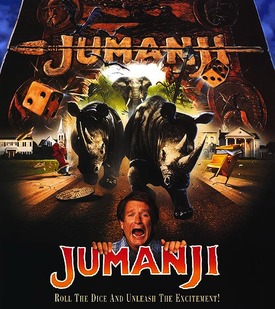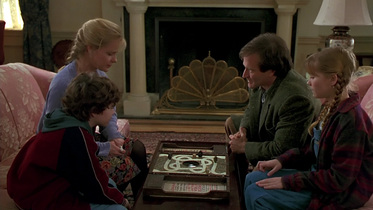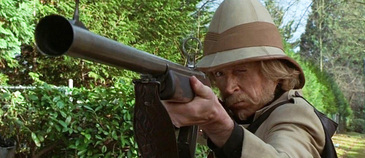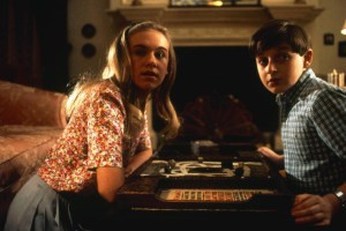
Jumanji
If you're a child of the 90's, it's a fairly safe bet that whenever you hear a deep, solitary drum beat a small part of your subconscious shivers with a concoction of fear and excitement. Your inner child, the one you've hidden behind a mask of work, coffee and other facets of adultness, suddenly remembers something, something you still secretly crave for. He, or she, feels the hairs on the back of their neck stand to attention. There's movement in the corner of your eye. You hear a distant, angry buzzing of wings. You feel the ground tremble beneath your feet. The king of the jungle roars, it's ferocity striking at the centre of your soul. The cocking of a rifle as the hunter circles in on his prey. A pack of monkeys steals your police car. Wait, what?!
Ok, maybe I'm letting my imagination get ahead of me, but deep down, isn't that the point of Jumanji?

Jumanji is a board game; a beautifully ornate board game that asks you to navigate your way through the jungle. Unfortunately, all of the dangers are real. Alan Parish, the reluctant legacy of a long line of influential businessmen, finds a board game buried at his fathers construction site. That night, he disappears from the face of the Earth. Decades later, two children hear the visceral drumming of Jumanji, and inadvertently release an adult Alan from his jungle prison, along with a whole host of horrors that can only be stopped by playing the game through to it's completion.
Robin Williams plays the adult Alan. Trapped for half a lifetime inside a hellish world where everything was out to kill him, including a viscous game hunter with his fathers face, there was no better man to play the fractured psyche of a boy forced to grow up without warmth, comfort or love. Forced to grow up without any idea of how to do so, William's brings a maniacal, child-like performance to a complex character. Whether through his childish actions or naive bravery, we're never unconvinced that, much like Williams outward personality, this is a child, fighting to break free of a man's body.
Described by many as a horror movie for children, Jumanji was solely responsible for a number of sleepless night throughout my childhood. With host of terrifying monsters released from the game, it's no wonder it's lasted so long in the minds of children the world over. We all have our own ideas regarding the games scariest trap, and whilst the giant spiders of the massive alligator come close, the fast spreading, man eating vines, with their spiny, cacti-like flowers, still hold a special place in the 'Fuck That' region of my brain; honestly, I can't look at a dandelion without shivering.

Then there's Sarah, Alan's childhood friend, and the only person who knows what happened when little Alan Parish disappeared. Ridiculed her entire life, Sarah is now a recluse, shutting out the world around her and even denying her own memory in favour of an easier-to-swallow lie.
As they play through the game, Alan rediscovers his old home and we're shown the damaging effects that came from Alan's disappearance. His father, who he'd once believed to be nasty, harsh and oppressive, bankrupted the family business searching for his son, and fell apart when he couldn't find him, eventually being overtaken by the grief of his loss. His downfall brought the town with him, replacing the ideal suburbia with an almost dystopic shell.
It's Alan's relationship with his father, that rings hardest with the audience. We've all clashed with a parent at some point; there's something about not doing as your told when you're young, and knowing everything when you're older that rings true with any viewer. We see young Alan struggling to follow the family traditions and rebelling against his father's 'harsh, oppressive' nature, which manifests in the big-game hunter, who is literally dedicated to hunting and killing Alan. However, armed with the knowledge that his real father wasn't the bully his childhood remembered, Alan gradually finds the courage and strength the realise he's not afraid any more. He's finally able to truly grow up.

Trapped in the game, Alan and Sarah lost their innocence and imagination, and it cost them their futures, but now, with their experiences, whether real or imaginary, they live the life they deserve, a life full of happiness and fulfilled dreams.
Jumanji shows us how damaging it can be to take away a child's imagination and innocence. In reality, we rolled the dice, moved our counter, maybe we got lucky, caught the bottom rung of the ladder and skipped ahead a few spaces, or perhaps we got caught by the snake and down we went. In our head, however, a whole different game was playing out. We were explorers, cutting through the jungle in a desperate search for ancient treasure. Along the way, we'd discover short-cuts that would make our journey better, but there were perilous dangers, monsters in the wilderness, ready to savagely cut our journey short. Ultimately, Jumanji was what we went through in our imagination, whatever we were playing, while our parents sat back like adults, refusing their inner children by telling themselves "It's just a game".
Deep down, they, like us now, still occasionally hear the beat of the drums, calling them to play.

 RSS Feed
RSS Feed
